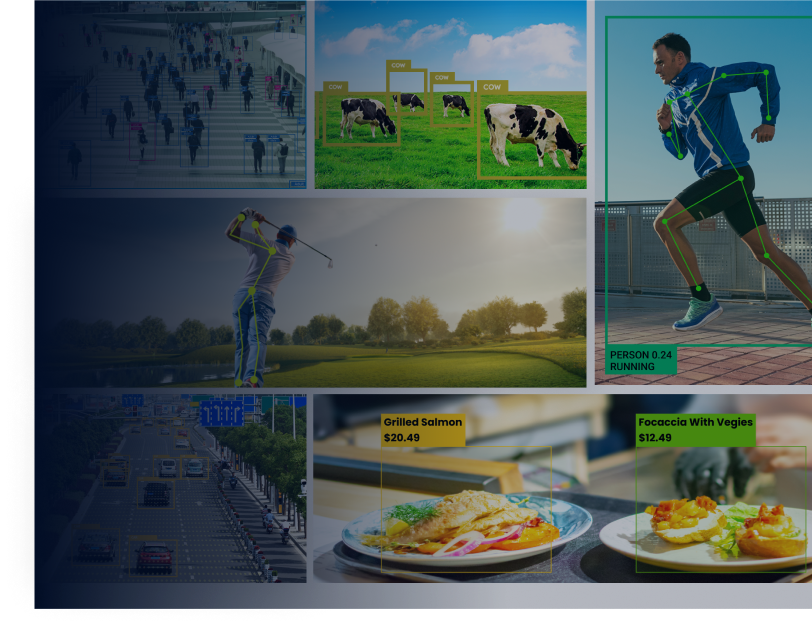We all follow sports broadcasting to catch key performances and major hits. However, the industry has evolved, now capturing even the smallest details to keep fans engaged. Every element is covered from real-time player tracking and ball speed to facial expressions and mic’d-up moments. The media easily taps into fan emotions by highlighting crowd reactions, injury replays, and multiple camera angles, turning local events into global spectacles. As Vin Scully said, “Broadcasting is a window to the world.”
Now, AI is taking that evolution further. AI is changing sportscasting through automated sports broadcasting, real-time analysis, and even commentary generation, bringing extraordinary speed, depth, and efficiency to sports coverage. How? Continue reading to explore the full capabilities of AI in broadcasting.
What is AI Sports Broadcasting?
AI Sports Broadcasting uses computer vision and machine learning algorithms to automate all coverage. It does everything alone, recording, analyzing, and streaming sports events with minimal human effort. It helps capture the best moments, track players, and even generate real-time commentary.
Core Technologies Involved:
- Computer Vision – Detects player movements, ball location, and game actions.
- Natural Language Processing (NLP) – Creates real-time commentary and captions.
- Machine Learning – Learns patterns to predict plays or automate camera work.
- Deep Learning – Powers advanced video analysis and decision-making.
How It Differs from Traditional Broadcasting:
- Less Human Involvement – Replaces large crews with automated systems.
- Faster Output – Real-time stats, highlights, and replays.
- Smarter Analysis – AI breaks down plays with more accuracy.
- Cost-Effective – Reduces production costs while scaling easily.
The Evolution of Sports Broadcasting
It all started with descriptions of games sent via telegraph in the 1890s. Imagine fans following a baseball game through coded messages. Expert broadcasters were required to devour mountains of stats, often printed reports or handwritten notes. For that, they combed past games, player histories, and team trends to identify storylines and talking points.
Another approach was for broadcasters to meticulously watch game footage and inspect key plays for potential highlights. This time-consuming process often used multiple projectors or clunky rewindable VHS tapes.
However, The advent of the internet transformed sports media. Websites like ESPN.com and BBC Sport offered real-time scores, news, and highlights, keeping fans constantly connected.
AI in sports broadcasting and social media platforms also started to emerge, which changed the whole persecution of sports media by analyzing vast amounts of data. It unearths hidden trends, suggests strategies, and even predicts player performance.
Thanks to these advancements, fans can now discuss games live, share their opinions, and connect with athletes more easily. Real-time sports graphics and AI also help us better understand game dynamics by tracking player movements and capturing particularly meaningful moments for fans, like facial expressions and moments of victory.
Key Applications of AI in Sports Broadcasting
AI in sports quickly documents key moments and delivers a focused, personalized viewing experience, keeping fans fully engaged. Remember that scene when Messi dribbled past defenders and scored? AI instantly captures and shares moments like that, so no fan misses this crazy moment. Beyond enhancing the fan experience, AI also powers advanced sports sponsorship solutions by identifying high-impact moments for brand visibility and engagement.
1. Automated Content Creation
AI changes how highlights are made—no more waiting for editors. It scans full games, finds big plays, goals, and key stops automatically. Plus, it creates summaries and scripts using game data, letting journalists focus on deeper analysis.
2. Personalized Viewing Experiences
AI personalizes sports by focusing on your favorite teams and players. It learns what you like and suggests content just for you. It also helps broadcasters show targeted ads, increasing fan engagement and revenue.
3. Better Live Streaming
AI makes live sports streaming faster and more reliable than ever. It adjusts video quality based on internet speed, so viewers always get the best possible experience. It can even predict network or server issues and switch to backups automatically to avoid interruptions. On top of that, AI works behind the scenes as a powerful sports video analysis solution, breaking down plays, tracking performance, and offering real-time insights for broadcasters and coaches alike.
4. Enhanced Analytics and Graphics
AI-driven sports analytics adds powerful insights to broadcasts. It tracks player movements, creates real-time stats, and predicts game outcomes. This makes watching more exciting for fans and provides valuable information for coaches and players.
5. Automated Cameras
AI-driven cameras easily tap into the details of the player and ball. They deliver dynamic, multi-angle views without anyone needing to control them. This AI solution knows exactly when to zoom and where to focus, so fans stay fully immersed and never miss their favorite moments
6. Instant Highlights
AI detects and shows real emotion in real time. It displays all key plays at once — goals, fouls, touchdowns — and generates highlight reels in seconds. This speeds up content delivery and satisfies today’s on-the-go fans who want quick access to game-defining moments.
7. AI Commentators
Now, we don’t need humans to watch and focus on every part of the game. AI-powered commentary and voice cloning can deliver live narration in different languages and styles. This breaks language barriers and gives fans a more personal, local feel no matter where they are.
8. Real-Time Analytics
AI puts live stats, player info, and win chances right on the screen. This helps fans understand the game better and keeps both casual viewers and hardcore fans hooked with detailed insights.
9. Personalized Experience
AI lets fans choose their favorite camera angles, stats, and join in with interactive features like chatbots and polls. This makes watching more fun and personal, turning viewers into active fans and building stronger connections.
Benefits of AI in Sports Broadcasting
The sports industry has evolved far beyond classic whiteboards and markers, where analysts relied on their expertise to explain plays. Now, AI simplifies production, customizes viewing experiences, and makes sports more accessible. It promotes efficiency, engagement, and inclusivity by tailoring content to each viewer’s preferences and history. Here’s a quick look at AI’s key benefits in sports broadcasting:
Scalability in Content Production: AI quickly creates highlights and generates content automatically, so broadcasters can share fresh updates faster. This lets human experts focus on deeper game analysis and creative storytelling.
Audience Engagement and Interactivity: AI personalizes content for each fan based on their favorite teams or players. It also adds fun features like fantasy sports tools and live game simulations to keep viewers engaged and involved.
Automated Content Localization: AI translates commentary and creates summaries in different languages. This helps broadcasters reach global audiences easily and makes sports accessible everywhere.
Content Discovery: AI studies what viewers like and recommends sports content they’ll enjoy most. This makes finding the right games or highlights simple, no matter what platform they use.
Real-Time Data & Analytics: AI on the Spot provides stats and player information during games. It also predicts outcomes, making watching more exciting and informative.
Cost Efficiency: AI automatically handles tasks like editing and commentary, saving broadcasters money and allowing them to create great content faster.
Challenges and Ethical Considerations of AI in Sports Broadcasting
In spite of the many benefits AI offers in sports, it is not without its challenges. Let’s take a closer look at a few key concerns.
1. Bias in AI Algorithms
The effectiveness of AI algorithms depends heavily on the quality of the data they’re trained on. If the data contains biases, AI in sports broadcasting may inadvertently perpetuate those biases in its outputs. For instance, biased historical data on player performance could distort AI-generated analysis.
2. Accuracy of AI Predictions
AI predictions rely on probabilities and, while often insightful, they are not foolproof. Over-reliance on these predictions could result in inaccurate commentary or misleading graphics.
3. Data Privacy
Sports broadcasts depend on a vast amount of data, which raises concerns regarding player and fan data privacy. Clear guidelines are essential to ensure that AI systems collect and use data responsibly.
4. Transparency in AI-Generated Content
As AI becomes increasingly involved in content creation in sports, maintaining transparency is paramount. Viewers should have the ability to differentiate between human-generated content and AI-produced reports or highlights.
The Future of AI in Sports Media
AI could greatly improve sports broadcasting by understanding the problems discussed and encouraging careful development. This means a more enjoyable and fair experience for everyone involved.
According to a report by Statistics MRC, the sports media and entertainment market is expected to grow at a compound annual rate of 38.1% from 2020 to 2027, reaching USD 90.5 billion by 2027. The future of Artificial Intelligence in sports media is brimming with possibilities. Here’s a glimpse into what might be on the horizon:
1. Natural Language Processing (NLP) powered storytelling
In the future, AI will analyze game data and generate dynamic narratives tailored to specific audiences. Think personalized game summaries for different fan demographics or in-depth player profiles that highlight their unique strengths and weaknesses.
2. AI-driven commentary bots
While human commentators will always be irreplaceable, AI bots could offer real-time, data-driven insights during broadcasts, particularly for lesser-known sports or leagues with limited broadcasting resources.
3. AI-powered simulations and visualizations
Imagine seeing AI-generated simulations of potential game outcomes based on real-time statistics and historical data. This could revolutionize pre-game analysis and offer a whole new level of strategic insights.
Conclusion
Artificial Intelligence is transforming the world of sports broadcasting. AI is no longer a sideline observer; it’s become a game changer, changing how we experience the sports we love. From curated highlights to interactive features, It tailors the viewing experience to individual preferences.
By carefully embracing AI in the sports industry, we can create an efficient, insightful, and personalized future of sports broadcasting. This means engaging and accessible experiences for fans worldwide. With AI, the game is set to reach new heights.
Frequently Asked Questions (FAQs)
How does AI enhance the production of sports broadcasting and media coverage?
AI automates tasks like highlight generation and content creation, allowing broadcasters to deliver fresh content quicker than ever before.
What are some examples of AI being used to personalize sports viewing experiences?
The visible example of AI personalizing the sports viewing experience is that it can recommend highlights based on fan-favorite teams and players.
What benefits does AI offer to sports broadcasters and content creators?
AI benefits sports broadcasters and content creators by automating tasks like highlight creation and content editing, saving time and resources.
What challenges do broadcasters face when integrating AI into sports media?
Broadcasters using AI face challenges with bias in algorithms. They need to ensure AI reflects reality accurately and doesn’t perpetuate biases in the data.
How might AI change the future landscape of sports broadcasting and journalism?
AI will the future landscape of sports by providing real-time stats, predicting game outcomes, and offering insightful analysis, enriching the viewing experience.

Manahil Samuel holds a Bachelor’s in Computer Science and has worked on artificial intelligence and computer vision She skillfully combines her technical expertise with digital marketing strategies, utilizing AI-driven insights for precise and impactful content. Her work embodies a distinctive fusion of technology and storytelling, exemplifying her keen grasp of contemporary AI market standards.









